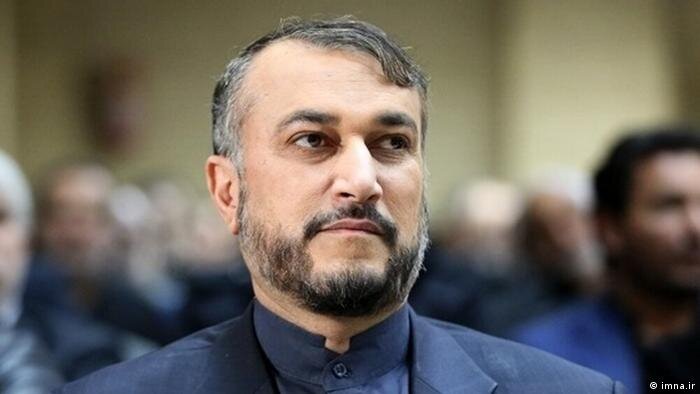Amir Abdollahian says concerns about Iran’s nuclear progress are unwarranted

TEHRAN — Iranian Foreign Minister Hossein Amir Abdollahian has said certain Western countries’ concerns about the progress of Iran's nuclear program were completely "unfounded".
The chief diplomat made the remarks as the Western signatories to the 2015 nuclear deal, officially called the Joint Comprehensive Plan of Action, are insisting on Iran’s return to the negotiating table as soon as possible.
"The European parties are interested in Iran returning to the talks," Abdollahian, who is in New York to participate at the annual UN General Assembly meeting, told the official IRNA news agency on Friday.
"One of their concerns is that they think we have broken some of our commitments to the JCPOA during the steps we have taken," Abdollahian stated.
Iran took remedial measures in response to the U.S. abrogation of the JCPOA in May 2018 and an inaction on the part of the Europeans to compensate Iran for the U.S. sanctions.
Iran started to gradually remove ban on its nuclear activities one year after the U.S. quit the JCPOA. Iran’s moves were based on paragraph 36 of the JCPOA.
(Paragraph 36 provided a mechanism to resolve disputes and allows one side, under certain circumstances, to stop complying with the deal if the other side is out of compliance.)
Former U.S. President Donald Trump not only returned sanctions lifted under the JCPOA it also introduced new ones under his “maximum pressure” campaign against Iran. Trump also introduced a total ban on Iran’s oil export, the main source of the country’s income.
Under the JCPOA Iran was obliged to put limits on its nuclear activities in exchange for termination of economic and financial sanctions.
The U.S. violated UN Security Council Resolution 2231 that endorsed the 2015 nuclear deal.
Late last year the Iranian parliament also approved a legislation obliging the Atomic Energy Organization of Iran (AEOI) to accelerate nuclear activities. It tasked the AEOI to increase the purity of nuclear enrichment, install advanced centrifuges, etc. The legislation explains if the sanctions against Iran are lifted in a verifiable manner Iran will reverse its decisions.
"They express baseless concern about the progress we have in our nuclear program, and their insistence for Iran to return to the talks is that they think we may reach a stage in our nuclear progress that is worrying in their opinion," Abdollahian commented.
Referring to his meetings with European officials during his stay in New York, the Foreign Minister said: "I told them frankly, first we have a religious fatwa on this issue, and secondly, we are talking about Iran's peaceful nuclear program."
Ayatollah Ali Khamenei, Leader of the Islamic Revolution, has issued a fatwa (religious decree) banning production, stockpiling and use of weapons of mass destruction, including nuclear arms, as haram (religiously forbidden).
Abdollahian said Iran has proven that there has never been any deviation in its nuclear plan, and reports from the International Atomic Energy Agency have confirmed this.
But, Amir Abdollahian said, most of JCPOA parties are insisting that the new Iranian administration enter the negotiating table soon.
"For us, the important point is that we will definitely resume the negotiations as soon as possible when our studies are completed, but the negotiations for negotiations will not be useful for our country and nation, and we will consider negotiations that have a tangible result."
While in New York, Abdollahian has so far met bilaterally with German, British and French counterparts, whose countries are signatory to the JCPOA. Abdollahian has also met with European Union foreign policy chief Josep Borrell, whose deputy was leading the Vienna talks before they were suspended due to the presidential election in Iran.
“We will return to the talks as soon as our examinations are completed, but we told the foreign parties to use this opportunity and prove your intention to us in a real and practical sense that you intend to return to your obligations and that you intend to respect the rights and interests of the Iranian people in full and in return meet the rights and interests of the Iranian people,” Iran’s new chief diplomat highlighted.
Earlier Abdollahian had said: "God willing, we will return to the negotiating table in due time, but a negotiation table that is fruitful and yield tangible results."
He added, "We are not negotiating with the P4+1 (the four permanent members of the UN Security Council – France, Britain, Russia, China – plus Germany) at the moment. We have talked to different parties individually and bilaterally. When the examinations of the Islamic Republic of Iran and the study of the JCPOA case are completed, the views will be exchanged at the negotiating table."
However, the Foreign Minister stated “one of the red lines of Mr. Raisi's administration is that we do not want to tie the country to the nuclear deal, tie the country to the Vienna talks."
The foreign minister said “if in line with this purpose the Vienna and JCPOA talks reach a conclusion, it is better, because it will become a catalyst, and our relations and economic progress will accelerate."
Leave a Comment